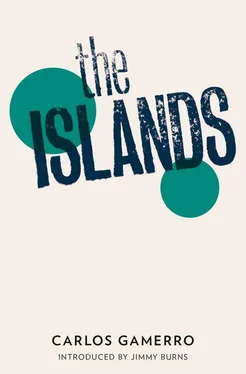And where did you see him?’
‘In the tower. In the invisibility room.’ I frowned, none the wiser. ‘There’s a point at the top from which you can see all points …’ he began, pausing out of courtesy for me to put two and two together, and feel suitably intelligent.
‘Ergo: there must be a point at the base that’s visible to all the others. That’s where our friend was?’
‘For days on end probably, biding his time. If it hadn’t been for his son’s heroic intervention, perhaps Sr Tamerlán by now …’
‘Wait, you’re getting me confused. You believe our friend meant to attack Sr Tamerlán.’
‘Or rob him. Business secrets maybe. It’s a common enough occurrence, between rival firms …’
‘So why would he hide just where everyone could see him?’ I finished saying and fell silent. The stolen letter of course.
‘What everyone in the tower wants to see is Sr Tamerlán. It is towards him, who is invisible, that our gazes are all directed. Who wants to look at what everyone can see?’ he concluded, his last words reduced to a hush by some indefinable sadness.
‘Perfect. But something doesn’t add up. How come you spotted him?’
‘I don’t even belong in the tower,’ he said without looking at me, and suddenly I was able to define it: the sadness of the exile. ‘I’ve only been in there three times in my life. The last time was that morning.’
‘Did you mention it to anyone?’
‘Not even my wife. Please tell Sr Tamerlán when you see him.’
‘What?’
‘That he can rest easy where I’m concerned. I won’t talk, even under torture. I’m … Come with me,’ he said, taking me by the arm and leading me to the glazed shopfront. ‘Look at them.’
On the imposing white façade of the building opposite, where only the strangeness of the light of day had prevented me from recognising the busy entrance of the Roxy, two enormous, bearded colossi — elbows on knees, heads between elbows — supported the entire weight of the building on their muscular stucco backs. They looked as if they could stay there for centuries, resigned to contemplating the traffic of cars and pedestrians along Avenida Rivadavia, oblivious to the cramp and the fatigue, the tedium, the desire to get up and go for a stroll down the pavement like everyone else while the masonry caved in behind them and the screaming pedestrians made a run for it.
‘He’ll realise one day. And when he does, he’ll send for me.’
* * *
I stopped for a few minutes on the pavement to check my list. Sheltering behind a flower stall to avoid getting caught in the stream of pedestrians, I dialled the next number on my mobile and got through to Dr Glans’s house, where a laconic housemaid suggested I talk to his surgery and hung up. I only had his address, so I rang directory inquiries. It was always engaged. I was still trying to get through when I saw them pull up.
They double-parked the blue Falcon, and the one I recognised checked the address on a PDA. They were both wearing expensive jackets of soft, black leather — rich men’s leather — and Ray-Ban sunglasses (the driver, gold frames and smoke-coloured lenses; the other, the same mirrorshades as the first night), steel Rolexes, gold chains. The passenger got out — his short, neat, greying hair, again freshly trimmed — avoiding the front bumper, whose buckled left side stuck out like a crumpled horn. The other one, scratching the back of his neck beneath his abundant white hair, adjusted his glasses on his red, carbuncular nose and settled down to wait, heater on, engine running. I had no reason to conceal myself; we were, after all, supposed to be collaborating, but I kept behind the flower stall all the same and, when the chance came, I melted into the crowd and moved on, walking round the whole block to reach the corner.
I took the Subte at Congreso and, once inside the carriage, I looked for the map to check how many stops I had to go. Forced to hang from the chrome bars for lack of any handles (if they were tall enough to reach them), people grumbled and muttered insults as they let me through. I finally reached the map, yellowed and streaked with coloured lines, protected by a sheet of cracked acrylic fastened to the cardboard plaque by ten screws, only five of which were left, and I noticed that someone had torn out the piece I needed through the loose part of the cover. Bored, I started to read the carriage’s advertisements attentively: a blonde in a flame-red jacket was hugging a stranger in parrot-green leather, while the print below read ‘Afrika Leathers’ with giraffe spots on the ‘Afrika’ as if the ‘k’ had given it leprosy or something. I was trying to work out the connection between the striking spelling and the even more striking colours of the leather when, segmented between the people waiting on the platform, I spotted the sign for Miserere and, kneeing and elbowing my way through the crush, I managed to reach the door and squeeze through a crack in the mob fighting to board the train.
I left Plaza Miserere after dodging an evangelist pastor, who tried to catch me with his megaphone as if it were a butterfly net, and, crossing the street, I plunged into the crowd of buyers and sellers under the arches and turned onto Calle Mitre to reach the surgery. I climbed to the second floor by a greyed marble staircase coiled like a hungry boa constrictor round the empty birdcage of the broken-down lift, and rang the bell at the side of a bronze plaque which read: Dr. Aldo Glans MD, Pædiatrician.
Inside, two mothers waiting with their children looked at my solitary, suited form with vague curiosity. I approached the receptionist, who dealt with me without looking up from the copy of Hello! he was leafing through.
‘Got an appointment?’ he asked, without bothering to see if I had any children in tow.
‘No, listen,’ I answered him. ‘I’ve already spoken to the doctor: it’s an emergency. Premature ageing … It was my tenth birthday yesterday and look at the state of me. A month ago nobody would have said I was a day over twenty. My years are like dog years, you know … Hence the urgency.’
I thought it would shake him out of his apathy, but he didn’t bat an eyelid; the two mothers, on the other hand, even before I’d finished, had clutched their respective offspring in padlock arms. Coolly the secretary got up and disappeared down the corridor, while the two children kicked to get free, and their mothers hissed at them furiously, pointing at me with their eyes and arching their eyebrows as I leafed through a few back-issues of Gente .
‘The Doctor will see you in a moment.’
The Doctor was a friendly queer with such a flashy satin tie that I almost shook it instead of the boneless hand he held out to me as he gave me a gentle smile through parted lips.
‘How can I help you, young sir?’
‘Where did you get the tie?’
I carefully noted down the address — somewhere in Recoleta; might stop by later on — and told him the reasons for my visit.
‘The meeting of Spanish Surprise last Wednesday was our five-hundredth, coinciding with the Fifth Centenary, and to mark the occasion those attending were given the sum of one thousand dollars,’ I rattled off, then paused, to watch his beady eyes acquire a glow to rival his tie, ‘plus another thousand for whoever contributes information to help us locate our ten-thousandth guest, who was present that night, but forgot to leave his details …’ I went on a while longer, though he’d obviously gone for it hook, line and sinker: for a grand I could have had him listening to stories about my sister-in-law’s varicose veins and still asking for more.
‘Doña Ernestina Hidalgo! She arrived with a very handsome young man: Eugenio; I don’t remember his surname. Then there was Dr Tarino and Dany — Daniel — Tabardo, but they’re already members, of course. Give me a second, let’s see … Can I offer you a coffee?’ He opened the door: ‘Eduardo, coffee … two coffees, please. Perhaps if I describe the people I remember by sight?’
Читать дальше











